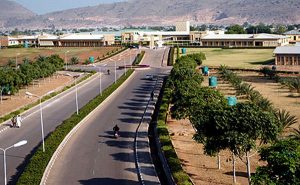 It was in the late 1970s at the University of Ibadan. A student who had performed very well and had just a mark or so to make a First Class in Political Science was not awarded a First Class. Infuriated by the interpretation that started building up to the effect that the student was not awarded a First Class because he came from northern Nigeria, the late Billy Dudley called the student in question to a session. Dudley hoped the student was not buying into any such interpretation of the decision other than that the University of Ibadan could not give anyone a First Degree in the First Class category. His explanation is that when a student gets that category, it means he or she is completely on top of the literature; it means his or her university fulfils the kind of student-lecturer ratio that could have produced that kind of result. It means the number of professors available in his or her department is within a certain range. First Class, he said, is more than the total marks scored in the Degree examination. It is also not something specific to the awarding university. A First Class in a Nigerian university must also pass any scrutiny any other place in the world.
It was in the late 1970s at the University of Ibadan. A student who had performed very well and had just a mark or so to make a First Class in Political Science was not awarded a First Class. Infuriated by the interpretation that started building up to the effect that the student was not awarded a First Class because he came from northern Nigeria, the late Billy Dudley called the student in question to a session. Dudley hoped the student was not buying into any such interpretation of the decision other than that the University of Ibadan could not give anyone a First Degree in the First Class category. His explanation is that when a student gets that category, it means he or she is completely on top of the literature; it means his or her university fulfils the kind of student-lecturer ratio that could have produced that kind of result. It means the number of professors available in his or her department is within a certain range. First Class, he said, is more than the total marks scored in the Degree examination. It is also not something specific to the awarding university. A First Class in a Nigerian university must also pass any scrutiny any other place in the world.
Some people might say that the discursive touch cannot be ruled out of what Dudley said but even that would not invalidate the question as to how many universities could be awarding many students First Class degrees even in the Humanities in contemporary Nigeria if the University of Ibadan could not easily think of doing that in the late 1970s?
The above is part of the puzzle about what the new generation of universities might be doing to the university system in Nigeria. Are they collectively raising the stakes in terms of quality and standards or otherwise? Hitherto, the University of Ibadan and the University of Nigeria, Nsukka sit on the front row in terms of age. They are closely followed by the University of Lagos, OAU at Ile-Ife and the Ahmadu Bello University, Zaria, the three that are age mates. Then the University of Benin comes along before the University of Jos takes its seat, followed by those in Calabar, Maiduguri, Kano and Sokoto, Ilorin and Portharcourt. Except one or two that one might have forgotten, these used to be the universities.

Yobe State University, Damatru
Then the state universities started coming, beginning with the old Bendel State under Professor Ambrose Alli, followed by what is now Olabisi Onabanjo University. All were in the early 1980s. Then the Federal Government universities of Agriculture and the universities of technology! The current category is the privately owned universities by faith based organisations, wealthy individuals and such other interests. It is that category that is in view here because the category seems to have remained under perceptual scrutiny as to whether they can and are doing it right. Nigerians who grew up along with the country appear to have naturalised the first, second and third generation of the universities in relation to the current category in particular. But the new generation universities tend to allow nobody the luxury of successfully ignoring them. They are always in the news even as what is so great in them is not too obvious.
Earlier this week, this platform understood Kwararafa University, Wukari to be striving to etch itself in communal development needs in terms of the transformative orientation of its academic programmes. This time, it was Igbinedion University, Okada that is showcasing itself on the international media. Individually and collectively, might we be dealing with an emergent subset in the university system whose products will soon challenge the World Bank’s idea of Nigerian university products being unemployable?

Prof Eghosa Osaghae, VC, Igbinedion University, Okada
For one, the Vice-chancellors of most of these new universities are mostly established scholars. Prof Yakubu Ochefu at Kwararafa University is a well heeled Historian. Professor Eghosa Osaghae at Igbinedion University, Okada is even regarded as a one man institution. He is unlikely to accept such inference but the inference suggests an idea of his place in academia in Nigeria and cannot be dismissed. Professor Mike Kwanashie at Veritas University, Abuja is a rated Economist, one of the masterminds of the intellectual ferment that gave Ahmadu Bello University Zaria its identity between the mid 1970s and the early 1990s. And the list can go on and on. Igbinedion University in particular must have impressed many in awarding Asantehene Otumfuo Osei Tutu 11 of the Ashanti Kingdom in Ghana an Honorary degree. Before that, those who thought that the position is a historical relic must be more than those who knew it is of this time.
But if these new universities are growing into iconic citadel of learning, why are they awarding First degrees in the First Class category? This is one of the asterisks that keep appearing against them in serious circles although older Nigerian universities are also into that practice. There is a major problem with that if the above UI story he late 1970s is anything to go by. While Nigeria reflects on all these, here is something from the Igbinedion University, Okada to reflect upon. The assumption in posting the video here in spite of the promotional or advertorial nature of the production is that those who are good in reading or deconstructing images can deduce one or two things in aid of an overarching conclusion on the role of new generation universities in the university system in Nigeria. Note that the video is neither original nor exclusive to Intervention.




























